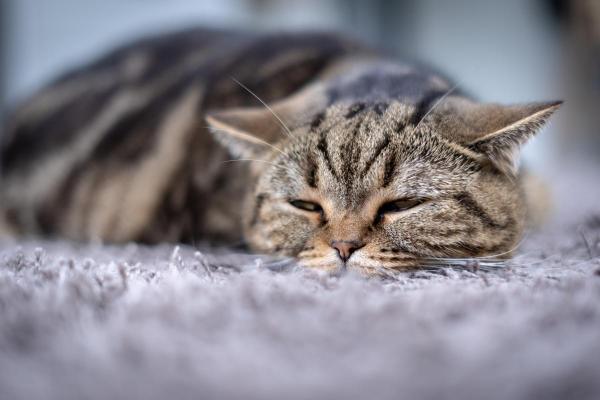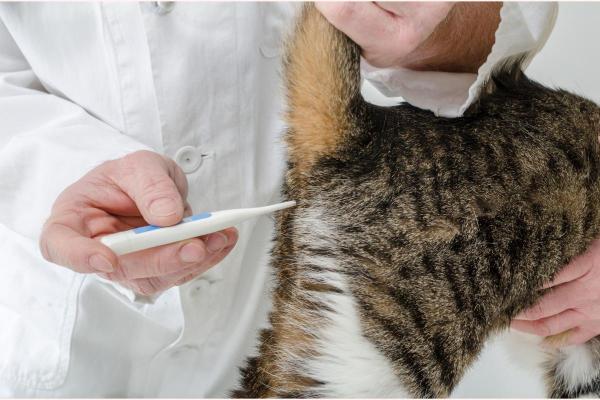My Cat Is Shaking - Causes and Treatment



See files for Cats
A cat can start shaking for any number of reasons, many of which are pathological. The extent of the shaking is also important since there is a difference between a mild passing tremor and a consistent episode of shaking. Whatever the cause of the cat shaking, it is important to know that it is not normal. It is a symptom of a problem, whether mild or severe. Context is also very important. For example, the age of the cat will be a significant factor. Older cats are prone to certain health problems that are less common in younger cats. The environment is another important consideration.
At AnimalWised, we explain why my cat is shaking by looking at the causes and treatment of tremors in cats. We help you to recognize possible causes of this symptom, but it is important to take the cat to a veterinarian to confirm a diagnosis.
Pain
Shaking is not a disease in itself, but a symptom of a health issues. Cats are generally good at hiding their pain, but once it has reached a certain level, their body will betray their sensations. When a cat suffers an injury, has a pathological issue or experiences pain for whatever reason, they can start shaking. This is due to organic mechanisms such as the release of adrenaline or increased blood glucose that affects their central nervous system.
You may see that your cat has a tremor in a specific place when you pet them. Although they may not be in pain when at rest, manipulating a certain area of heir body can affect their nerves and result in pain. Manifestation of pain is not relegated to shaking alone. Unlike dogs, cats rarely vocalize their pain unless it is very acute. Instead, the cat is likely to go to a hiding place as they are feeling scared and unaware of what is happening to them.
Other symptoms of pain in cats include:
- Apathy
- Appetite loss
- Withdrawal
- Lethargy
- Excessive licking of an injured area
- Reduced hygiene
- Aggressiveness
Cats also express themselves through body language. When a cat is in pain, they may furrow their brow, close their eyes tightly or simply try to hide their expression. They may remain curled up to try to persevere through the pain, but eventually they will need to be treated.
Treatment of pain in cats
Sometimes the cause of the pain is obvious. If they have a wound or injury after getting in an accident, treating this injury will stop the pain. Especially with cats that have outdoor access, we may not know the cause of the pain. Regardless, we will need to take them to a veterinarian to diagnose and treat the problem. They will also assess for secondary issues. Analgesics such as NSAIDs may be used, but the treatment will be directed at the cause.
Cold
Even with longhair cat breeds, cats can feel the cold. In fact, cats will make an effort to seek out warm spots in the home if they feel any kind of chill. This is why they lie in suntraps or hide behind warm appliances. If a cat is shaking when they are asleep, it is possible the temperature has dropped and their body is responding accordingly. Usually, the cat will wake up and move somewhere warmer.
Treatment of cold in cats
When your cat feels the cold and starts shivering as a response, you normally don't have to do anything. Unless there is a risk of hypothermia, the cat will simply move somewhere warmer of their own accord. If the home is too cold for some reason, such as a power outage, you will need to provide some warmth. This can be a box with a blanket in it or even letting the cat lay on top of your to share body heat.

Hypoglycemia
The cat may be shivering due to hypoglycemia, which is the term for low blood sugar. This condition may be due to illness or simply not eating for a long time. If due to prolonged fasting, the tremor is easily resolved by feeding the cat. In case of diseases such as diabetes in cats, the animal must be treated correctly and as soon as possible.
In mild hypoglycemia, the cat will exhibit anxiety, tremors and weakness. When blood glucose drops dramatically or rapidly, more serious signs of hypoglycemia in cats occur. These include seizures, coma and death. In kittens, hypoglycemia can become very serious and lead to the animal's death more easily. We need to ensure they nurse regularly and larger kittens will need to be have their dietary needs met accordingly.
Treatment of hypoglycemia in cats
If you think your cat has low blood sugar, the first thing you will need to do is take them to a veterinarian. The causes are varied and include everything from Cushing's disease to tumors on the pancreas. The veterinarian will have to assess the cat and introduce the corresponding treatment. This includes surgery for tumors or continued insulin treatment for cats with diabetes.
Fear or stress
Although environmental and pathological causes of shaking in cats are common, it is also possible a cat is shaking due to fear or stress. This is unlikely to occur all of a sudden. It is more common in cats that have experienced trauma in the past or have been exposed to stressors over a long period of time. This is why it is common for newly adopted cats to be shaking.
Cats that shake due to stress are usually doing so because their body is releasing adrenaline. It is not possible for a cat to maintain this for prolonged periods of time. If they are shaking all the time due to stress, it will have a detrimental effect on their organism. We will likely see other signs of stress in cats such as weight loss, hair loss and even aggression.
Treatment of stress in cats
Although it is not always possible, the best way to treat stress in felines is to determine the cause. If we can remove the stressor, it is likely their anxiety will decrease. Whatever the cause of the stress, we will need to create a calm environment for the cat. We will need to ensure their basic needs are met, they have a comfortable place to stay and we do not push them too far.
Neuromuscular diseases
If your cat's legs are shaking, it is possible they are suffering from a neuromuscular disorder. This occurs when signals from the brain are being sent incorrectly. There may not be anything specifically wrong with the muscles, the brain signals cause them to twitch or tremble. In these cases, when the neuromuscular disorder has progressed, the cat may not only shake, but eventually may not be able to walk at all.
Treatment of neuromuscular disorders
It is necessary to go to a veterinarian as soon as possible. The cause of the neuromuscular disorder may be a tumor, trauma, infection or even a hereditary issue. With such a diverse range of causes, only a veterinarian can assess the cat and provide an appropriate treatment option. In some cases, this may be symptom management as the neurological disorder may not have a cure.
Poisoning
Cats can ingest a range of substances which can be toxic for them. Even if they are safe for us, there are substances to which cats can have a very serious reaction and will go into toxic shock. In addition to muscle tremors, poisoning in cats can lead to a wide range of symptoms which include:
- Vomiting
- Diarrhea
- Weight loss
- Blood stools
- Convulsions
- Ataxia
The substance to which the cat has been exposed can be toxic plants for cats, household cleaning products, certain foods or even as the side effect of medication. This is especially the case if the cat has eaten medication which is intended for human use such as ibuprofen or paracetamol.
Organophosphates are used to control fleas, ticks, and lice, both on animals and in the environment. In these cases, the poisoning generally occurs through the skin or the mouth. They can cause symptoms such as tremors, restlessness, salivation, vomiting, diarrhea, abdominal pain and frequent urination, among others.
Treatment of poisoning in cats
Quick action is key. If they are not treated in time, the intoxicants can be fatal in some cases. It is important to see a veterinarian as soon as possible. They may induce vomiting, depending on how long has passed since ingestion of the poison. In some cases, this can exacerbate the situation, so options such as fluid therapy or stomach lavage may be the correct course of action. The cat will need to be supported until the substance leaves their system.
Fever
Fever is the body's response to an infection. If the cat's temperature is higher than usual, it means that their health is being compromised. Among the symptoms of fever in cats we find tremors and chills, lack of appetite, general weakness and a hotter-than-normal nose. Likewise, it is possible to observe other signs that will depend on the pathogen causing the infection, such as that the cat shaking and vomiting.
Treatment of fever in cats
How fever is treated will depend on the underlying cause. Viral infections cannot be cured, but the cat will need to be supported while their body fights the pathogen. Bacterial infections can be treated with antibiotics, but it will be up to the veterinarian to determine the correct product for the corresponding pathogen.

Muscle spasms
Muscle spasm is a sustained involuntary contraction of muscle fibers in response to injury or inflammation. It can occur for a variety of reasons, such as sudden trauma, spinal damage or injury to the muscles and tissues that support it. Muscle spasms are not normal in cats. They are a clear indication that something is not working correctly in the animal's body.
Treatment of muscle spams in cats
Again, it is necessary to find the cause that results in the cat's spasms. This will require going to a veterinarian. Do not hesitate to visit a veterinarian to make a diagnosis and establish the best treatment.

This article is purely informative. AnimalWised does not have the authority to prescribe any veterinary treatment or create a diagnosis. We invite you to take your pet to the veterinarian if they are suffering from any condition or pain.
If you want to read similar articles to My Cat Is Shaking - Causes and Treatment, we recommend you visit our Other health problems category.







